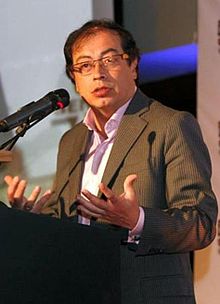Gustavo Petro Urrego
| Gustavo Petro | |
|---|---|
 |
|
| 797th Mayor of Bogotá | |
|
In office April 23, 2014 – December 31, 2015 |
|
| Preceded by | María Mercedes Maldonado (Acting Mayor) |
| Succeeded by | Enrique Peñalosa Londoño |
|
In office January 1, 2012 – March 19, 2014 |
|
| Preceded by | Clara López Obregón |
| Succeeded by | Rafael Pardo (Acting Mayor) |
| Senator of Colombia | |
|
In office July 20, 2006 – July 20, 2010 |
|
| Constituency | Capital District |
| Member of the Chamber of Representatives of Colombia | |
|
In office July 20, 1998 – July 20, 2006 |
|
|
In office December 1, 1991 – July 20, 1994 |
|
| Constituency | Cundinamarca Department |
| Personal details | |
| Born |
Gustavo Francisco Petro Urrego 19 April 1960 Ciénaga de Oro, Córdoba, Colombia |
| Nationality | Colombian |
| Political party | Progressivists Movement (2011–present) |
| Other political affiliations |
Alternative Democratic Pole (2004–2010) Regional Integration Movement (2002–2004) Alternative Way (1998–2002) |
| Spouse(s) | Mari Luz Herrán Cardenas Verónica Alcocer García |
| Alma mater | Universidad Externado de Colombia, Pontifical Xavierian University, University of Salamanca |
| Profession | Economist |
| Website | www |
Gustavo Francisco Petro Urrego (born April 19, 1960) is a Colombian politician and economist. He was mayor of the capital city of Bogotá. In his youth, he was a member of the militant guerrilla group 19th of April Movement, which later evolved into the Alianza Democrática M-19, a political party in which Petro also participated. Years later he would become the presidential candidate for the Alternative Democratic Pole in the 2010 Colombian election, but placed fourth in the election after the now President Juan Manuel Santos, Antanas Mockus and German Vargas Lleras respectively. In 2011 Petro ran for Mayor as a member of the Movimiento Progresistas (Progresistas Movement). He won the election for Mayor of Bogotá, the second most important position in Colombian executive power, garnering 32% of the vote and defeating former mayor Enrique Peñalosa, Gina Parody, and Carlos Fernando Galán.
During his administration as mayor, he faced a recall process started by opposition parties and supported by the signatures of more than 600.000 citizens. After the legal verification 357,250 signatures were validated, many more than legally required to start the process. On December 9, 2013, Petro was removed from his seat and banned from political activity for 15 years, by Inspector General Alejandro Ordóñez Maldonado, following the sanctions stipulated by the law. His sanction was allegedly caused by mismanagement and illegal decrees signed during the implementation of his waste collection system. This led to a series of protests citizens who deemed the Inspector's move as controversial, politically biased and un-democratic.
Despite being granted an Injunction by the Inter-American Commission on Human Rights, which suspended the sanction imposed by Inspector General Ordoñez, President Juan Manuel Santos upheld the removal and Petro was removed from office March 19, 2014. For his temporary replacement, Santos appointed as Mayor the current Labor Minister, Rafael Pardo. On April 19, 2014, a magistrate from the Superior Tribunal of Bogota ordered the president to obey the recommendations laid out by the Inter-American Commission on Human Rights. Petro was reinstated as mayor on April 23, 2014.
...
Wikipedia
